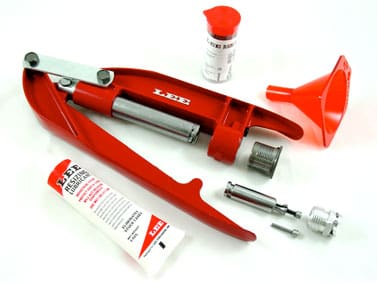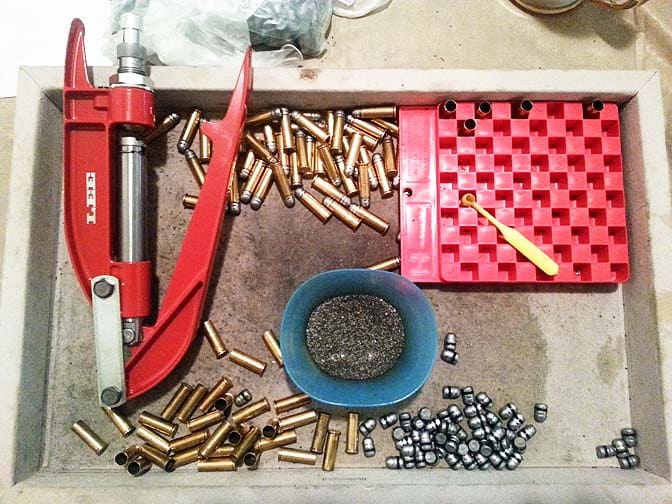By Jim Duke
Thanks to the high prices and crappy availability of ammo these days, I’ve been hand loading most of the .38/.357 ammo I shoot. I started out using the LEE handloading kit. Even though I generally like the press, one thing I’ve had a problem with is all the dang hammering involved. Since I never could get the knack of hammering quietly, my wife and kids hated to see me break out my reloading stuff. I can’t really blame them since I usually felt the need to put some ear plugs in myself. Also, all that banging “allegedly” played a part in the demise of our coffee table but that has yet to be proven . . .
Since I don’t have the desire or space to own a big, expensive loading press I was pretty happy when I saw the LEE Hand Loading Press online. After some searching I found one for about $45 that came with an attachment for priming my brass. I saw one that didn’t come with the primer for about $10 less. I’m not really sure why anyone would go for that one. I happily paid for my new press and headed home to play.
Right out of the box I noticed two things about the LEE press. The first is that it’s very lightweight. That made me happy because I had every intention of sitting in my chair in front of the TV for much of my reloading activities. The second thing I noticed was how well made it felt despite being so light. I felt confident that it would last far longer than my interest in hand loading. Nothing about the press feels cheap.
My press came with a tube of case lube, a funnel, and the aforementioned case primer. The primer can be set up for both large and small primers and assembles in seconds. I have primed several hundred cases with it so far and it works great. It may not be as fast as some case primers out there but if you are doing it to a smaller scale as I am, it’s more than adequate. It’s definitely better than banging them into the case with the other kit.
LEE dies can be installed and swapped in seconds with no tools needed. For noobs like me, Lee includes some fairly thorough instructions that do a good job of demonstrating the proper use of the dies. At every stage of the hand loading process, the LEE Hand Press operated smoothly and once I got the hang of it, I was producing rounds that looked almost as good as factory loads. Of course my wife likes it because she doesn’t have to listen to a bunch of racket every time I want to load some ammo.
The overall design of the press offers good leverage which allows lazy people like me to use the least amount of force possible and still get great results. I’ve loaded a few hundred rounds with this press and have never had to press very hard, even when crimping. I’d say that even my eleven year old son could easily use it with no problem.
The beauty of the LEE Hand Press is that it doesn’t need to be mounted to work. That means I can load ammo almost anywhere. I usually like to pop in a movie, sit in my recliner and take my time loading a hundred rounds or so. Also, since I travel for work, I can put everything I need for loading into a box and take my whole setup with me out of town. Since I’m currently working in Wyoming, which is a shooter’s paradise, this is great since I spend most of my free time goofing around out in the badlands.
If there’s a negative about the LEE Hand Press it would have to be that in gaining portability, you give up economy of movement. The press is by no means hard to use, but if a guy had to load a thousand rounds, he’d likely be better off with one of the mounted setups. By the time I get finished loading a hundred rounds or so, I’m pretty sick of doing it. I don’t really see that as a bad thing since small scale loading is what it’s made for and it does a great job.
Here’s a decent down and dirty demo of the LEE press by GunsKnivesSurvival:
http://www.youtube.com/watch?v=kkZ0eue9te8
I can’t help but recommend the LEE Hand Press. It’s an outstanding value for the price (MSRP $68.00) and a good way for beginners to get into hand loading. It’s also a good tool for more experienced loaders who might have a need for a portable press from time to time. With the LEE Hand Loading Press and the right dies, you can get everything you need to start loading for just over $100 – or about half the price of the full size presses I’ve seen.
A version of this review appeared at Jim’s blog, Unsolicited Biased Opinion and is reprinted here with permission.






I’ve had one for over 10 years. Until I got my Pro-1000 (and now the Classic Turret), I did pretty much all my handloading on it.
The ergonomics are “sub optimal”. Beyond that, the thing is very, very handy. It’s a much better choice for getting into reloading at the bottom end than the Lee Loader kit.
Well crap.
If I would’ve known about this earlier I would own one.
Moving into a larger place tomorrow with my own reloading room.
Hah! Same here, probably. Now I have a Dillon progressive reloading press on order and a room already all set up for reloading.
That would be fun. If I could find primers. Which I haven’t seen anywhere in a good long while. Maybe when components start flowing again.
I have one. It is nice, leverage is a bit low so it may take more effort. But it takes up very little space. Good low cost way to get into reloading. Might be useful at the range too, take along primed and sized cases and work up loads on the spot.
I now use their basic cheapo press, good enough for pistol cartridges. Mounted to a 2×4, I just clamp it to the workbench when I need to use it.
Geez, I remember those hammer days.
This looks like you could easily take it to the range and play with different loads.
Hmmm, may have to get one of these.
Thanks for the write up!
I too remember the “hammer days”. My wife hated that thing! Still, the Lee Loader was good to dip my toes into the reloading pool. I think they were about $18 for everything needed to start reloading, except for the hammer.
Fortunately, my father inlaw took pity on me and gave me his old Redding single stage and MecJr 12 gauge presses.
I still see some uses for this Lee Hand Press. Sometimes it is just too hot to stand in the garage loading. For a resonable price, I could do some stuff on the couch.
My first kit, many years ago, was one of the hammer kits. Irritated my first wife and the neighbers. We lived in an apartment then. Traded a .22 rifle for a RCBS Rock Chucker press and ended the complaints. Moved back to the country shortly thereafter and set up a back yard range. Was shooting about 200 rounds a week from my Ruger .357 and a little each week from a variety of center fire rifles.
This was 30+ years ago but if I remember correctly I was loading 3 grains of green dot with a 158 grain wadcutter or semi wadcutter, depending on what my supplier had in stock, in .38 cases for target shooting.
These Lee hand presses are handy little gizmos. I have known a few benchrest shooters who like to load at the range when they are experimenting with different powder charges, and they use this Lee press. Good review.
Is my cursory inspection of the specs correct that you could load .300 Win Mag with this thing?
If so, that’s crazy awesome.
Will the same dies work when you upgrade to a standard, bench mounted press?
Don’t know about the .300, but it doesn’t use any special dies.
Yes, they are standard dies. The newer model has a breech lock that allows changing dies without readjusting.
My Lee dies work in my Lee hand press, my Lee turret press and in my Hornady progressive press. I also use some RCBS and Hornady dies. For the handgun calibers I reload anyway the dies have the same threads etc.
Resizing magnum rifle cases with this thing should produce forearms Popeye would be jealous of.
Most of the guys I knew that reloaded for their rifles didn’t full length resize unless they planned on using the rounds in different rifles. They just neck sized for the rounds they tailored to a specific rifle. Saved work and they claimed it was easier on the brass.
Exactly.
Another advantage of single-shot (bolt, falling block, etc) rifles over semi-autos.
Neck sizing is easier in brass and okay in the same rifle, but it can cause some feeding problems. You’ll notice that the bolt is harder to close sometimes, which can matter on follow up shots. I have noticed my neck sized loads to be slightly more accurate.
Yep. I’ve got a few Lee presses for various things (Breach Lock classic cast {used mostly for case re-sizing or decapping for test loads for rifle}, classic cast turret {primary pistol press}, and a Loadmaster for volume rifle loads). Yeah, I should have probably just gotten a Dillon 650, but wth…
Anyway, the whole breach lock thing makes it all interchangable (well, sort of). I use the little hand press for decapping for resizing if I want to hang out in the front room and watch something, rather than the bat cave. And you can get popeye arms in the process
I’ve used the Lee Hand press to load 30-06. Both 30-06 ad .300 Win Mag are about the same length so it should work. It’s a tight fit though and I can attest that the sizing process has made my arms stronger.
Loading on your couch is bad news. Lead and mercury residue everywhere.
On a quiet thursday morning at the range I will do load development at the bench using one of these presses. 5 rounds at a time at .5 grain increments till I find my sweet spot.
Thanks for doing this review. I was hectoring TTAG readers to look into these hand presses many months ago because they are so inexpensive and small to pack up if you don’t have room to set up a reloading bench.
In Ye Olde Days, back when reloading was common, but progressive presses were still in the future, Lyman 310 tools loaded a truckload of ammo for guys. They even used volumetric powder measurement in little powder cups (on handles) so that you could easily throw a “standard” charge of a known powder for a rifle or pistol case. Of course, back then, there were only a few powders, so fixed volume cups worked pretty well.
You could get a pretty small reloading setup for a single rifle or pistol caliber with a hand press.
The hand presses have their place but the ergonomics suck. My hands get tired after hand priming 200 cases for reloading with my RCBS primer. The hand press is pretty limited in its abilities but it serves your part time plinking 38 reloading fun. I caution you on one thing in your reloading. The reloading manuals warn people not to eat, drink, or do things like watch tv while reloading. This is where you run into problems with double charges, no charges, no primer, bad seated bullets and the like. For a noob I recommend a partner press from RCBS. Its 82 dollars on amazon and you won’t have to suffer through the hammer life either. The only hammers I have on my reloading bench are the ones I drift sights with and the inertial bullet puller. No other pounding allowed. Not even on my dies that I have a arbor press for.
The RCBS Partner Press is the second thing I recommend to newbie reloaders. It is a wonderful little press, and suitable for re-sizing rifle brass. It isn’t the press of choice for wildcat re-sizing, but for neck sizing or full length re-sizing of brass into semi-autos, it works really well.
The RCBS Partner reloading kit is a screaming deal – it has the press, the primer flip tray, scale, lube, etc.
For situations where people are sizing for wildcats, then we get into the Rockchucker or custom presses. I’m building up a swaging press (very much like a Corbin press) which will double as my wildcat press.
I dove head first into a Rock Chucker from the git go and now that I am doing wildcats like the 30BR I am a thankful man. There is no way you could ever, ever, ever form a 30BR or anything like that on a hand press. I grit my teeth when that sizing die bottoms out but its part of the process.
I just ordered one of these as well as dies. I am new to reloading and I was wondering if anyone that has used this can provide a list of the additional items which are not included (other than the obvious powder and cases) and must be purchased in order to reload.
Thanks.
I woulda say that the short list should include a set of Lee scoops and a scale and maybe a good reloading book.
A good reloading manual is a must. Pay extra for the carbide dies and you won’t have to lube. Depending on the type of rounds you load you may want to, after you get set up and under way, include a case trimmer, scales, bullet puller, case cleaner.
Joseph,
In addition to the lee hand press and a set of dies, this is my idea of the minimum for loading. You can start with the hand press kit and add from there, as money allows. Each item you buy will make things more efficient and accurate.
1. $10.00-A good manual, like the Lee Reloading book. This gives you load data plus info on loading in general. The “how and the why”.
2. $12.00-Lee Dipper set. You can volumetricly use different powders for your loads. It has a slide chart for conversions. So popo volumetric measurement, but that is how the commercial people do it. It will take some practice for consistency.
3. $15.00-Case trimmer, Chamfer tool, pocket primer. Cases stretch with shooting. You will have to eventually trim them to spec. Then they must be chamfered to ensure it is smooth for bullet seating. Primer pockets will need to be cleaned.
4. $30.00- Lee hand primer. This is just easier.
5. $40.00-Digital loading scale- slower then the dippers, but you can be perfectly accurate every time. This consistency is what sets your handloaded ammo apart from the factory stuff.
This is just a small list that can be purchased incrementally as time and funds allow. Please do not flame me for the prices being out of date. Of course, you can and will buy much more. Everything you buy from here will make the job easier, more efficient, or more accurate. There is no need to jump into reloading while spending a ton of cash. It takes time to learn. In the end, reloading should give you very acccurate loads for YOUR GUN, some zen relaxing time to yourself, and some cost savings. Especially with the more expensive rounds. I would never shoot my .45Colts without reloading.
Most importantly, learn as much as you can and remember safety. Safety is the most important thing with reloading.
Joseph – Add some kind of “loading block” that will hold 50 cases, mouth up, after you fill them with powder. And then ALWAYS, ALWAYS take a small flashlight and look into all of the cases, row by row, to be sure you have the same level of powder in each case. This is CRITICAL when you are loading pistol cases such as .38/.357 which were originally designed for bulky black powder. Modern powders – such as Unique and Bullseye – result in very small charges in these large cases, so they are very easy to double-charge if you are not paying attention. This can be caught by looking into ALL of the charged cases before you start seating the bullets, because a double charge will stand out when you look at multiple charged cases.
I prefer to use two different loading blocks in different colors, the one with the empty cases on one side of the powder filler, the one with the filled cases on the oder side.
Very nice review and an interesting piece of gear. Thanks.
Lee should totally invest in making a quick detach table clamp. Definitely beneficial to have that feature as an add on
I would buy that.
They Did.
I used a Lee Hand Load kit for 6.5×55. I didn’t like the idea of hammering in primers so I bought a Lee Auto-Prime as well. The noise was so bad I had to reload when my parents were away. The loads were so-so. I found the powder scoop was very inaccurate and at best was making very light loads that were almost under-charged when I checked the loads on a scale.
When I moved into an apartment, I set up a Hornady Lock’n’Load press. Quick, quiet, and the powder charges were more consistent and in the proper range with a powder thrower and trickler. Since then, I haven’t looked back with reloading about 30,000+ rounds in a variety of calibers, including: 6.5×55, .223, .303, .308, and 8×57.
I am always amazed at lees products for two reasons…
The dies are great. No issues there.
The lower priced presses are basically flimsy junk that seem to work semi well.
I own high end brands and some lee presses that got me started. If you think lee is the answer to your prayers you obviously have never used quality equipment.
Lee fits the bill for people who can’t afford better gear and there seems to be a lot of that in the world.
Once I upgraded past lee single stage presses I was blown away on how rugged other brands are. No flex in the ram. No chinsy handle and wobbly assembly.
I don’t make a lot of money but I saved until I could afford to get much better gear.
I guess what I am saying is you get what you pay for with lee. The basic press is 27 bucks at midwayusa.com and it works fairly well. The only thing that saves a lot of lees products is for the price paid it works. If you were to really look at what you bought though you would see it would be better to save up and get something that would last a lifetime.
I was hoping an elitist would show up…….
My only criticism isn’t of the Lee press but the practise of reloading whilst watching a movie, or doing anything else for that matter.
Making a mistake when reloading has the potential to injure or even kill, so pay attention to the process, rather than something less important.
Especially with pistol cartridges such as .38spl or .357mag. Very easy to double-charge. Do that with most rifle cartridges and you’ll have to clean up the powder that spilled out of the case.
Will Horady dies work in this hand load press.
Thanks for the review. For people looking for more info, here’s a post that Nick did last year that features lots of pictures and a video of him using it: Ask Foghorn: Reloading for Dummies
I have used one of these for the past year. I have loaded .38, .357, .308, .223, .22H, 30-06 and .45ACP. I’m getting ready to venture off into .45-70 and have had 0 problems with this setup. I am guessing I have loaded 1000 round or so with it over the past year.
That being said, my handloads for my .223 varmint rifle shoot the same .5MOA as the guy with the $1,000.00 Dillon, so for those who think expensive is better because it’s expensive, then spend it like you’ve got it and simulate the economy.
The only thing I do different than most is I scale measure EVERY charge, even for lightly loaded plinking stuff. Call me a prude but the scoop thing just aint good enough for me and my guns (and my fingers) when I’m the one scooping. It’s too easy to get sidetracked and double scoop a .357 and add the ka to the boom.
I have my whole setup in a large hand tool box (except powders), and can grab it and drag it wherever I need to go to do my thing.
I would recommend this little press too anyone to reload who has limited space.
Nothing like it for load development at the range. A FF arsenal digital scale, components and chrono beats back and forth to the man cave (or lady’s lair)
Comments are closed.